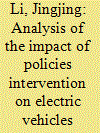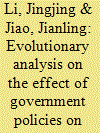| Srl | Item |
| 1 |
ID:
176863


|
|
|
|
|
| Summary/Abstract |
Electric vehicles (EVs), which can relieve the pressure of energy and environment and revitalize the automotive industry, are paid great attention by the government. Existing research on the dynamic adoption process of EVs from the perspective of consumers based on complex social networks is insufficient. Based on the consumer network with dual attributes, i.e., positive/negative attitude and whether or not to adopt, this paper explores the impact of economic and information policies on EVs adoption rate by establishing a decision-making model of EVs adoption for consumers considering the effects of friend attitudes and power consumption information. The results show that: (1) The joint implementation of economic policies has a prominent effect on the adoption rate of EVs that is least affected by the subsidy cut policy when charging at home. (2) Enhancing popular science propaganda promotes the EVs adoption rate by increasing the initial proportion of positive attitudes in the consumer network. However, the promotion effect will be weakened if it exceeds a certain threshold. (3) Encouraging social discussion by expanding the number of friends has two sides to the EVs adoption rate. Finally, policymakers should consider the impact of consumers with different risk preferences on EVs adoption.
|
|
|
|
|
|
|
|
|
|
|
|
|
|
|
|
| 2 |
ID:
166484


|
|
|
|
|
| Summary/Abstract |
In response to severe energy and environmental challenges, electric vehicles (EVs) have been thoroughly considered by governments. Although China has become the largest EV market, currently the limitations of EVs and decreasing subsidies have led to a challenging future. To promote EV diffusion, we use a complex network evolutionary game method to explore the dynamic impacts of government policies on EV diffusion in different scale networks. The results show that with the increase in manufacturers in the network, the degree of EV diffusion increases accordingly at the same government policy level. In the present network scale of manufacturers, on the supply side, the effects of tax and subsidy policies can respectively promote EV diffusion to 0.82 and 0.86. Fuel vehicle (FV) license plate restrictions and consumer purchase subsidies are effective policies on the demand side, which both can promote EV diffusion to 0.84. Compared with consumer purchase subsidies, production subsidies for manufacturers have better effects on EV diffusion. Neither the tax and subsidy policies nor the FV license plate restriction and EV purchase subsidy policies can realize full EV diffusion. Finally, combined with the current status of China's automobile industry, the corresponding policy recommendations for different periods are given.
|
|
|
|
|
|
|
|
|
|
|
|
|
|
|
|